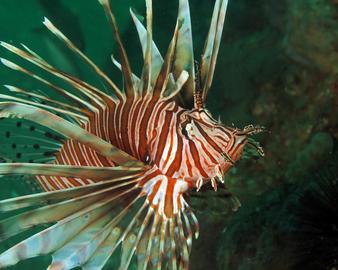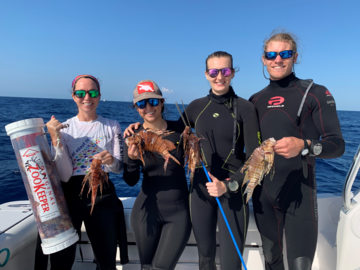Frequent culling of the invasive Indo-Pacific Lionfish throughout the Caribbean has been shown to cause a shift towards more wary and reclusive behaviour by lionfish, which has prompted calls for halting culls. This paper, co-authored by REEF Lionfish Program researchers, addresses those concerns and reviews research conducted by REEF and other research efforts. Culling successfully lowers lionfish numbers and has been shown to stabilise or even reverse declines in native prey fish.
Current search
Search found 422 items
- INVASIVE
During last month's REEF Florida Keys Lionfish Derby & Festival, twenty teams fished from sunrise to sunset for two days, and ultimately collected 1,215 invasive lionfish. The event concluded on Sunday, Sept. 12 at Postcard Inn Resort & Marina in Islamorada, with an outdoor festival featuring lionfish tastings, cooking and dissection demos, games, interactive booths, and live music.
This seminal publication was created by REEF and our collaborators at NOAA, ICRI, the United Nations Environment Programme, Caribbean Environment Programme, SPAW-RAC, and the over 40 participants of the 2010 Caribbean Regional Lionfish Workshop. The guide provides best practices for lionfish control and management, including control strategies, outreach and education, research, monitoring, legal considerations, and ideas for securing resources and partnerships.
REEF, in collaboration with the University of Virgin Islands and Buck Island National Monument, took a major step last week in a novel study to better understand lionfish movement and factors that may influence that movement. The study, focusing on a 2km area of patch and continuous reef in St Croix, used innovative underwater tagging techniques pioneered by REEF to surgically implant transmitters into invasive lionfish within an array of receivers, allowing the team to pinpoint movement of the fish over the next year.
This article highlights the collaborative efforts of conservationists throughout the Gulf of Mexico and western Atlantic who work to combat the invasive lionfish, including REEF's work to orgnanize removal events such as the Florida Keys Lionfish Derby & Festival.
WHAT:
REEF, the Reef Environmental Education Foundation, will host a free educational presentation and discussion about the recent invasion of Atlantic waters by Indo-Pacific lionfish. Though no confirmed sightings have been made in the Florida Keys, the fish have become established along the U.S. east coast, Bahamas and Bermuda and are moving rapidly throughout the Caribbean.
Join REEF staff Dr. Alli Candelmo for an update on current research findings of the invasive lionfish in the Tropical Western Atlantic.
[Originally scheduled for Wednesday, December 4th, 2019, but rescheduled due to Presenter illness]
In this early paper, staff from REEF and NOAA studied feeding ecology of the invasive lionfish (Pterois volitans). The authors collected stomach content data from fishes taken throughout the Bahamian archipelago. Three relative metrics of prey quantity, including percent number, percent frequency, and percent volume, were used to compare three indices of dietary importance. Lionfish largely prey upon teleosts (78% volume) and crustaceans (14% volume).
This article highlights some of the ways that the Upper Keys community has adressed the invasive lionfish, including REEF's 8th Annual Earth Day "Locals" Lionfish Derby held on April 23-25, 2021 in Key Largo.
Learn how to safely conduct lionfish removals by attending a REEF Invasive Lionfish Collecting & Handling Workshop.
Workshops include a classroom portion that covers background on the invasion, lionfish biology, ecological impacts, current research, and collecting and handling techniques. After we wrap up the classroom portion of the workshop, we will head out to the water for a 2-tank dive to put our skills to work.



